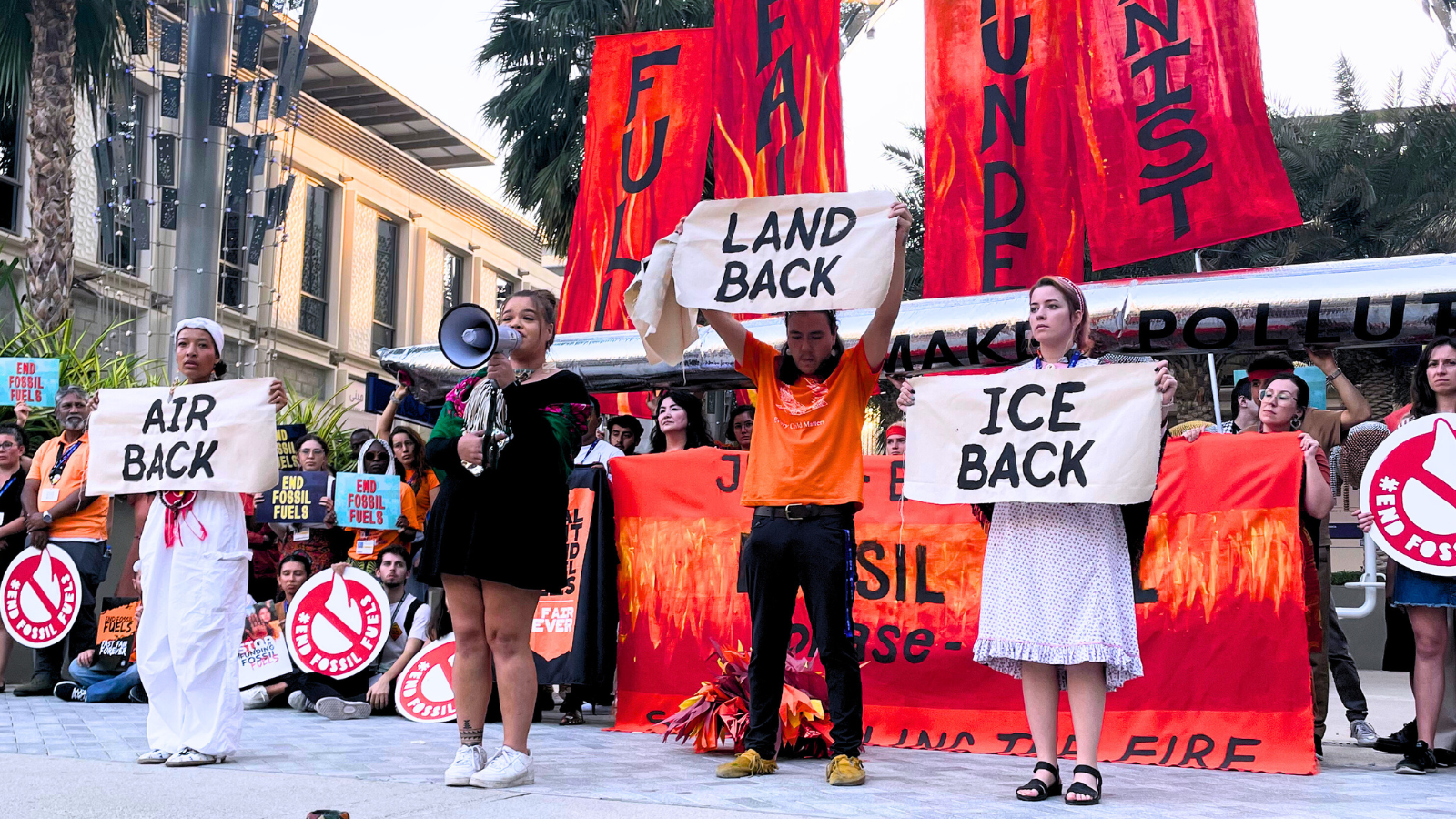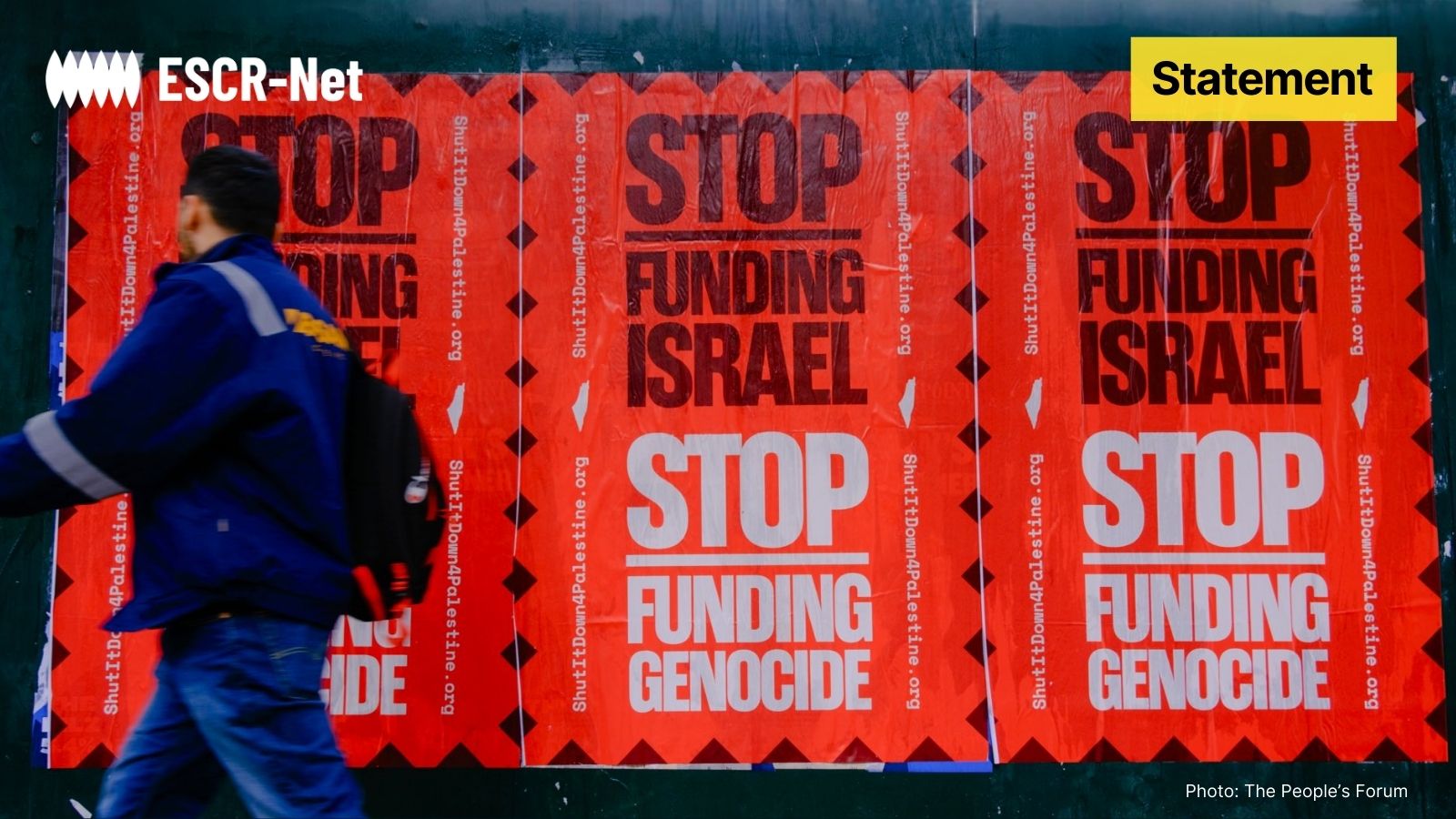As COP29 draws near, ESCR-Net members are mobilizing behind a robust, justice-driven agenda to demand that climate action centers human rights and uplifts frontline communities confronting the devastating impacts of the climate crisis.

Our members will be in Azerbaijan (Nov 11-22), pushing hard to dismantle imperialist, corporate-driven climate narratives, calling out false solutions, and ensuring that human rights and intergenerational justice aren’t sidelined but lead the charge in shaping a fairer, more just and equitable future for all.
What We Stand For at COP29: These Are Our Five Main Demands
1. Centering Peoples-Led Solutions and Decolonizing Climate Narratives
The climate crisis requires real solutions—not corporate greenwashing. ESCR-Net is pushing for Indigenous and peoples-led climate actions prioritizing collective rights, sustainability, and harmonious coexistence with nature. We are exposing false solutions labeled as ‘climate actions’ but in reality rooted in corporate capture and greenwashing, fueling extractivism and corporate profit while harming communities and ecosystems.
We demand: Center Indigenous and peoples-led solutions in climate policy, opposing corporate-driven false solutions like carbon credits, carbon capture, and “Nature-Based Solutions” that prioritize profit over sustainability. This approach includes implementing the right to self-determination and recognizing the right to remedy and reparations, especially for historically oppressed and subjugated communities, including those in situations of occupation, settler-colonialism and apartheid.
Check: La Ruta del Clima: Our Right to Climate
2. Loss and Damage Fund: We Need a New Climate Finance Model Urgently
The Global North countries must recognize and pay for their climate debt. They must be held accountable and contribute through predictable, needs-based, public funding to the Global South communities most affected by climate devastation. We are calling for real and adequate financial flow from the wealthiest nations. Financing should distinguish between development aid and climate action funds, flowing as grants rather than loans to avoid further indebting the Global South.
We call for: Establishing a transparent financing structure separate from development aid, prioritizing funding for loss and damage with clear mechanisms to enable direct community access. We call for a reformed climate finance model grounded in justice and accountability instead of the existing model that places the financial burden on the Global South countries that are least responsible for climate change. We demand debt cancellation and an overhaul of the debt infrastructure to relieve Global South countries from taking on additional debt for a crisis they didn’t cause. Loss and damage funding should be designed to deliver intergenerational justice, ensuring that today’s resources support a sustainable future for the generations that follow. Climate policy must consider the long-term well-being of all peoples and communities disproportionately affected by the climate crisis.
Know more about what we are doing collectively in ESCR-Net Contributions to the UN to Address Climate Justice with a Focus on Loss and Damage
3. Ending Corporate Influence in Climate Negotiations and immediate divestment from the arms industry
With fossil fuel companies and corporate interests wielding outsized influence, it is urgent to stop corporate capture of climate negotiations like COP and prioritize human rights protections over profit. The climate crisis can only be tackled through a truly democratic process that includes civil society and communities on the frontline of the climate crisis. On the same breath, militarization, conflicts and illegal occupations across the world is exacerbating the impacts of climate crises while profiting businesses. As a means to guarantee climate justice, there is a need to regulate the arms industry along with an immediate divestment from this harmful sector. Investments should be re-directed towards real, peoples-led climate solutions in order to address the climate crisis.
We also demand stronger regulation of fossil fuel industry participation in climate-related negotiations to curb their influence in climate policy.
4. Realizing a Just and Equitable Transition Grounded in Human Rights
A just and equitable transition requires a shift away from extractivist models to ones that respect human rights and support Indigenous rights, gender justice, and care economies. This transition should ensure protections for human rights and gender equity, especially for historically oppressed and subjugated communities who are on the frontline of the climate catastrophe.
We strongly propose: This transition must prioritize community-led data collection and data justice to ensure accountability mechanisms that reflect the lived experiences of those on the frontlines. Community-led data collection should guide decisions to promote accountability in mineral and resource extraction. We also demand strategic investment in care economies including gender-equitable systems that redistribute the burden of unpaid care work and protect the rights of women and care workers.
Know more about the ESCR-Net Community-led Research Program. https://www.escr-net.org/initiative/community-led-research/
5. Protecting Environmental Human Rights Defenders
COP29’s host country, Azerbaijan, has come under scrutiny for its historical repression of human rights defenders. ESCR-Net stands with civil society organizations and climate justice movements calling on the UNFCCC and Azerbaijan to secure safe participation for all, particularly for those speaking out against environmental harms. We are urging a strong commitment to and realization of the protection of environmental human rights defenders who are threatened or criminalized for their work.
We urge: Strengthening protections for environmental defenders in climate agreements and ensuring that the host country agreement for COP29 is publicly accessible and includes enforceable human rights provisions. We further urge the UNFCCC to ensure host agreements include strong guidelines for and ensuring human rights protections.
Check CliDef: COP29: Guide to Azerbaijan and Holistic Security for Participants – https://www.climatelegaldefense.org/cop29
And Amnesty International’s tool to combat spyware threats: https://securitylab.amnesty.org/get-help/
Join Our Call for Climate Justice
The demands of ESCR-Net echo the urgent voices of communities on the frontlines of climate breakdown, whose lives, territories and resources bear the scars of the climate crisis. Members of the Network argue realizing climate justice also requires a meaningful implementation of the right to a clean, healthy and sustainable environment which must ensure the realization of the human right of peoples to self-determination and intergenerational justice and equity. Communities must be free to determine and advance peoples-led climate solutions based on care and harmonious coexistence with nature and be able to hold the global polluters accountable for preserving the planet and ensuring well-being of the future generations.
As we head into COP29, we invite you to amplify these demands and join us in advocating for a just and equitable transition, real climate financing flow, and an end to corporate capture and impunity. Together, we can shape a future rooted in justice, accountability and dignity for all.
The following members will be available for comment during the 29th Conference of the Parties (COP29) to the UN Framework Convention on Climate Change, held from November 11–22 in Baku. For interview requests, please contact our press room through Angélica Cuevas at acuevas@escr-net.org, or reach out directly to Patricia Miranda Wattimena, Environment Working Group Coordinator, who will be on-site at pwattimena@escr-net.org .
Look at the list of all our members attending COP29 to schedule an interview.
- Countries
- Initiatives
- Issues
- News Categories
- Working Groups

